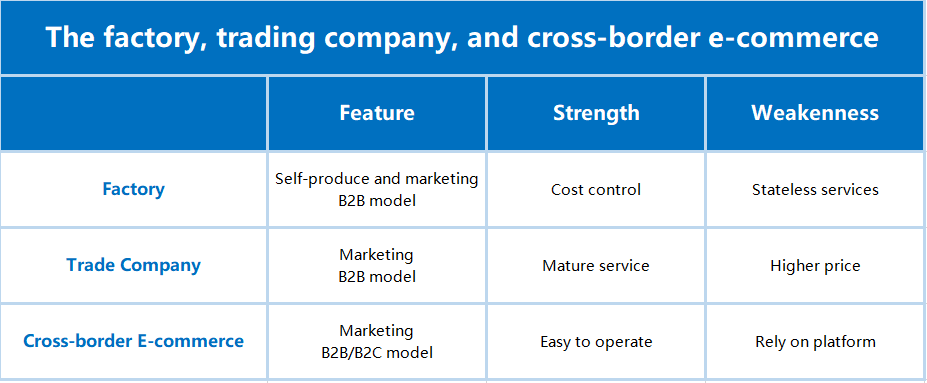
What’s the advantage of the factory, trading company, and cross-border e-commerce?
Some topics will never be out of date, such as “What’s the advantage of the factory, trading company, and cross-border e-commerce? and Which is in the current trend between factory, trading company, and cross-border e-commerce? There are a thousand Hamlets in a thousand people’s eyes. The question is usually a matter of opinion, as everyone starts from a different position. Today we will tell you the answer directly.
How about the factory?
Generally speaking, the factory is the source of production, the most direct place of production. But if specifically, there are many kinds of factories, which can be mainly divided into two types: factories that only focus on production (prefer domestic trade), and factories that integrate industry and trade (prefer foreign trade). The two way of thoughts and communication is quite different.
Domestic trade: it can be determined quickly by a phone call or interview.
Foreign trade: To check the product cost and how much profit should be added. If the product is in a small amount, what is the express fee? If it’s in a large amount, then it needs to be shipping. Which is more suitable between 20 Foot Container or 40 Foot High Cube, and also there is a surcharge, etc. We will not get feedback immediately. If the price or the freight is considered to be high, or the quantity of the order changes, it will take time to make it again.
How about a trading company?
It is a foreign trade company that does not have its own factory and needs to sourcing. The trading company may have multiple suppliers, which are more flexible than the factory, but the price is not as competitive as the factory. They can also be roughly divided into start-up companies, developing companies, and mature companies.
How about cross-border e-commerce companies?
Cross border e-commerce refers to cross-border transactions and payment settlement through the e-commerce platform. An international business activity that delivers goods and completes transactions through cross-border logistics. Compared with cross-border e-commerce, traditional trade refers to the way of international business activities without a cross-border e-commerce platform.
The most direct difference is that cross-border e-commerce transacts in an online platform, while traditional trade is offline. The most common B2B cross-border platforms are Alibaba international station, Made-in-China, etc.And the most common B2C platforms are eBay, Amazon, Aliexpress, etc.
But in fact, there is no obvious distinction between online and offline. Many B2B cross-border e-commerce companies are also doing offline trade. And they also choose the mode of combination of online and offline.

Traditional factory: the advantage is that the product cost is controllable. But the problem-solving and coordination ability is relatively weak because the process involved is relatively stereotype and the change is difficult. They pay more attention to production and ignoring customer demand expression.
Traditional trading companies: the advantages are flexibility, problems can be adjusted in a short time. Their service awareness is also strong, but the price is not dominant compared with the factory. They are unable to make decisions without authorization cause they need to negotiate with the factory.
Cross border e-commerce companies: their advantages are also flexible and changeable. They can sell any product popular in the market. Moreover, they can be operated in a simple method, which is not as complicated as traditional trade. However, they are so dependent on the platform that they are constrained by the rules of the platform, which has less space for independent control.



